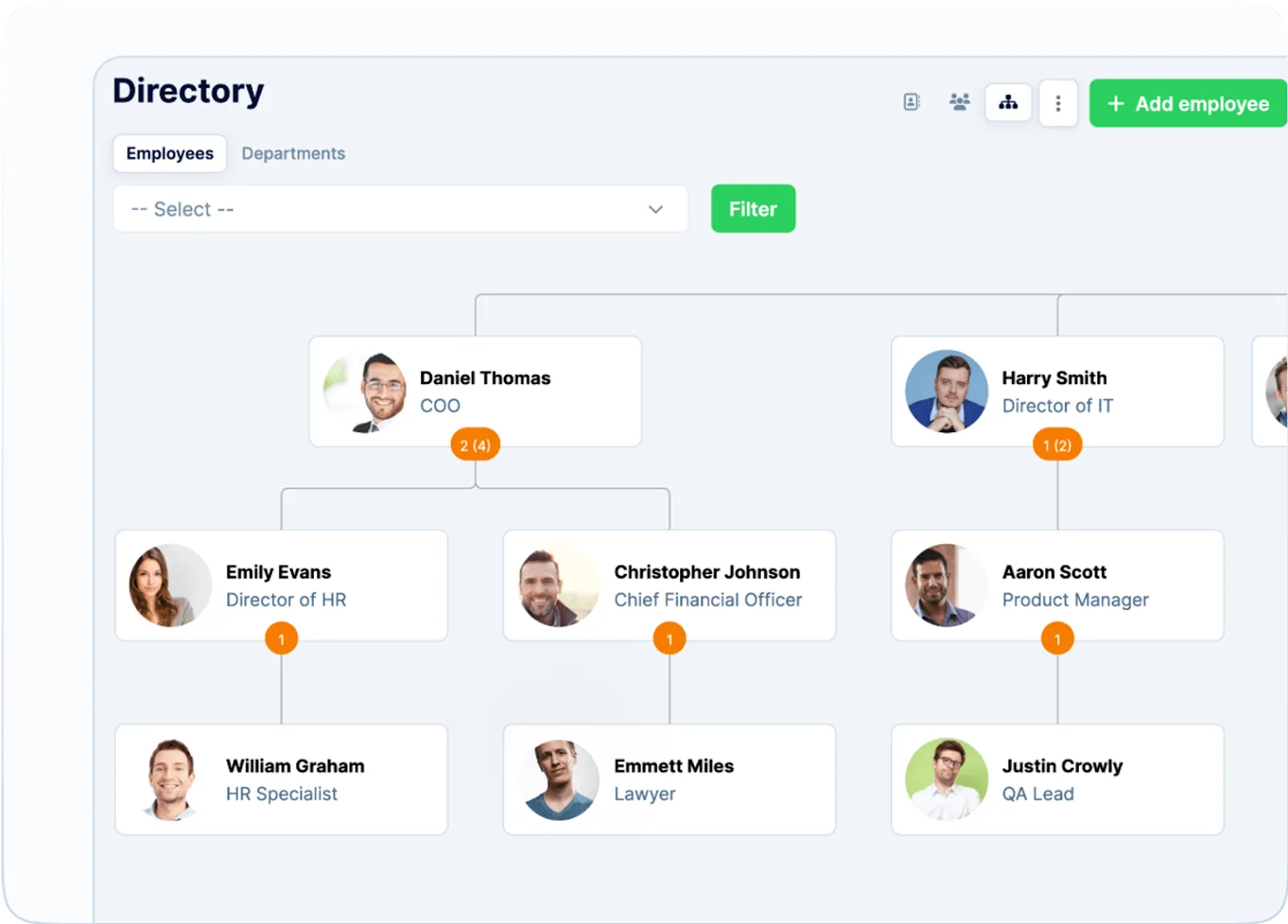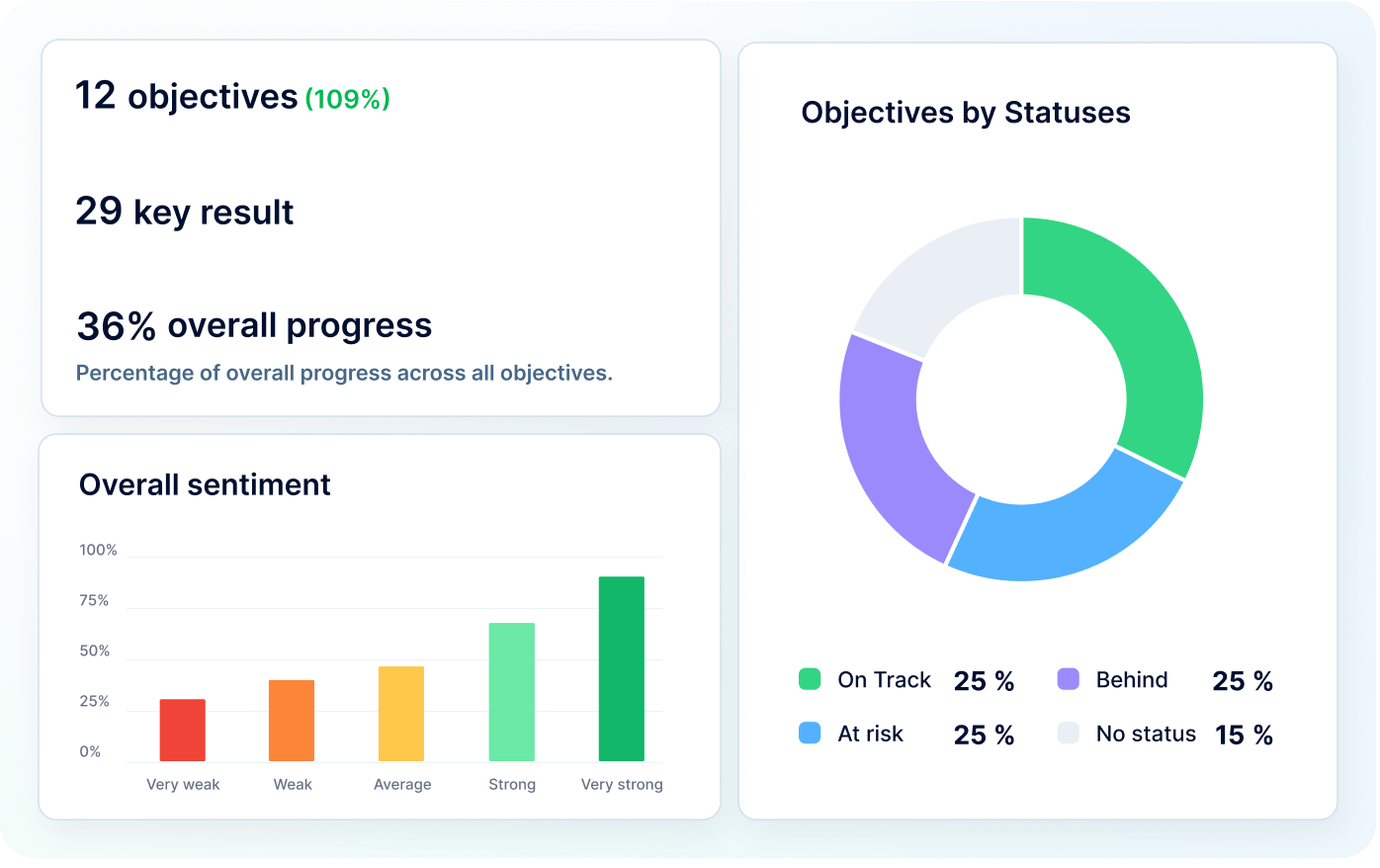
Decoding CEO, CFO, COO, CMO, and More – Understanding Common Job Abbreviations
EO, CFO, COO, CMO – these common C-suite abbreviations appear more and more frequently in business communication, yet they're not always fully understood. In this guide, we clearly explain the primary responsibilities of each role within a company’s structure to help you navigate the corporate hierarchy and communicate effectively with senior executives.

Create your company's organizational structure in PeopleForce
CEO vs. COO vs. CFO – Who's Who in the Organization: Decoding C-Suite Roles
Business language and organizational structures are constantly evolving. As companies grow and expand internationally, they adapt to new market realities. This is why job titles like CEO, CFO, COO, and CMO appear more frequently in recruitment advertisements, LinkedIn profiles, and everyday business conversations – positions that weren't as common in the business environment a decade ago.
Navigating this growing web of job titles and abbreviations can be confusing, especially since roles and responsibilities are defined differently across organizations. We've prepared this guide to help candidates, employees, and managers better understand who's who in the company structure and what they're responsible for.
Chief Executive Officer (CEO)
The Chief Executive Officer (CEO) is the highest-ranking C-level executive in a company, responsible for overall organizational direction. Standing at the top of the corporate ladder, the CEO reports to the board of directors or company owners. Other C-suite executives such as the Chief Financial Officer (CFO), Chief Operating Officer (COO), and Chief Marketing Officer (CMO) report directly to the CEO. In some cases, particularly in small companies and startups, the CEO may simultaneously be the founder and owner (known as a founder CEO).
The CEO makes crucial business decisions, sets the strategic direction for the organization, and represents it externally to investors, business partners, media, and the public. CEOs of major companies, such as Satya Nadella (Microsoft), Tim Cook (Apple), or Cathy Engelbert (Deloitte US), have enormous influence not only on their organizations but entire industries and global markets.
In the company's daily operations, the CEO connects all business areas – from financial planning and technology to sales and human resources. While not directly managing each department, they have the decisive voice in strategic matters such as market expansion, strategic investments, organizational changes, and new product development.
Key skills and experience required for effective CEOs:
- Strategic thinking and ability to make decisions under pressure;
- Experience managing teams and large-scale projects;
- Knowledge and understanding of the market in which the company operates;
- Ability to anticipate trends and adapt to changes;
- Leadership skills and ability to inspire other senior executives to action.
Chief Operating Officer (COO)
The Chief Operating Officer (COO) is responsible for the company's day-to-day operations. The COO ensures implementation of the strategy established by the CEO or board, to whom they report. Their primary responsibilities include process optimization, cost control, timely project delivery, and effective resource allocation. In practice, they manage the company's routine business operations and serve as the CEO's “right hand”.
In technology, manufacturing, or service organizations, the COO vs. other executives differs in their crucial role in maintaining high-quality operations and delivering value to customers.
Key skills and experience required for effective COOs:
- Proficiency in managing operational activities and processes;
- Experience with executive leadership and team coordination;
- Analytical skills ability and efficiency orientation;
- Quick decision-making and problem-solving capabilities;
- Strong organizational and communication skills.
Chief Financial Officer (CFO)
The Chief Financial Officer (CFO) is responsible for the company's finances, budget planning, and oversight of all financial aspects of the organization. Reporting directly to the CEO, the CFO plays a significant role in strategic decision-making. They collaborate with accounting, controlling, tax departments, and other board members.
The CFO manages capital structure, financial reporting, cost control, and financial data analysis. Their tasks include financial planning, supporting investment decisions, analyzing company strengths and weaknesses, managing financial risks, and proposing corrective actions, while ensuring compliance with financial regulations. They also communicate with investors, banks, and auditors.
Key skills and experience required for effective CFOs:
- Advanced knowledge of finance, accounting, and data analysis;
- Ability to forecast and manage risk;
- Experience in budget planning and cost control;
- Analytical thinking and strategic mindset;
- Skill in creating financial reports;
- Strong background in financial institutions and investments;
- Leadership and collaboration abilities.
Chief Technology Officer (CTO)
The Chief Technology Officer (CTO) develops and implements technology strategy and introduces emerging technologies that support business strategy and goals.
The CTO's responsibilities include overseeing product development processes, system architecture management, and leading technical teams. They make decisions regarding system scaling, security, and technical competency development within the team.
The CTO typically reports to the Chief Executive Officer and works closely with the Chief Information Officer and technology teams.
Key skills and experience required for effective CTOs:
- Profound understanding of information technology and software development;
- Ability to connect business goals with technological objectives;
- Capacity to build and lead engineering teams;
- Knowledge of technology trends and their business applications;
- Strategic competencies and development orientation.
Chief Information Officer (CIO)
The Chief Information Officer (CIO) manages the company's entire IT infrastructure. They're responsible for overseeing corporate information technology systems that support internal processes. They also define IT department strategy. The CIO collaborates with IT teams, security, operational, and financial departments, usually reporting directly to the CEO or COO.
The CIO's most important tasks include managing ERP systems, IT security, data access, and hardware and software used by employees. They continuously monitor IT system integration processes to ensure technology effectively supports business development and teams' day to day operations.
Key skills and experience required for effective CIOs:
- Broad knowledge of IT, data security, and system management;
- Experience planning and implementing IT solutions;
- Ability to manage IT projects and teams;
- Understanding business needs and translating them into technological solutions;
- Capacity to ensure organizational continuity through technology.
Chief Marketing Officer (CMO)
The Chief Marketing Officer (CMO) is responsible for all company marketing activities. This C-suite executive drives the brand’s visibility, customer engagement, and business growth through marketing strategies.
The CMO aims to build brand image, increase recognition, and support sales through effective promotional activities using appropriate communication channels. The CMO reports directly to the CEO and works closely with sales, product, and communication departments, as well as external service providers like creative agencies.
Key skills and experience required for effective CMOs:
- Knowledge of strategic and operational marketing;
- Ability to analyze data and draw conclusions;
- Experience building and developing brands;
- Creativity and customer orientation;
- Leadership abilities and teamwork skills.
Chief Risk Officer (CRO)
The Chief Risk Officer (CRO) identifies various risk management factors that may affect company operations. Their main goal is to protect the organization from financial risks and reputational losses.
The CRO develops and implements risk management policies, monitors regulatory compliance, and prepares the company for potential crisis situations. They work closely with legal, financial, operational, and security departments, promoting best practices and a consistent approach to risk management.
Key skills and experience required for effective CROs:
- Risk identification and assessment capability;
- Experience creating and implementing risk management policies;
- Ability to make quick decisions under pressure;
- Analytical thinking skills;
- Knowledge of law, finance, and crisis management;
- Experience in audit, insurance, or compliance areas.
Chief Sales Officer (CSO)
The Chief Sales Officer (CSO) is responsible for executing the company’s sales strategy and revenue growth plan. They oversee sales teams, develop relationships with key clients, and ensure effective implementation of sales processes. Their duties also include market analysis, sales forecasting, and coordinating cooperation with marketing and customer service departments. The CSO manages regional sales directors and reports directly to the Chief Executive Officer.
Key skills and experience required for effective CSOs:
- Proven success in managing high-performing sales organizations;
- Advanced negotiation and interpersonal abilities;
- Strong market knowledge and understanding of customer needs;
- Ability to create and implement effective sales strategies;
- Results orientation and skill in motivating and inspiring teams;
- Expertise in building and scaling business operations.
Chief Compliance Officer (CCO)
The Chief Compliance Officer ensures the company operates in accordance with applicable laws, industry regulations, and internal standards. Their role focuses on preventing violations and minimizing legal and reputational risk management.
CCO responsibilities include developing and implementing compliance policies, conducting internal audits, training employees, and collaborating with legal authorities and external auditors. They typically report directly to the Chief Executive Officer or Chief Financial Officer and work closely with legal, HR, and operational departments.
Key skills and experience required for effective CCOs:
- Knowledge of legal regulations and industry standards;
- Experience in compliance management and conducting audits;
- Ability to create and implement internal policies and procedures;
- Meticulousness, responsibility, and ability to maintain independence;
- Strong communication skills to clearly convey risks and requirements.
Chief Communications Officer (CCO)
The Chief Communications Officer is responsible for the organization's internal and external communication. Their role includes building a cohesive company image, managing media and stakeholder relations, and supporting crisis communication. They collaborate with marketing, Human Resources, PR, and executive leadership to ensure alignment and consistency. The CCO typically reports directly to the CEO.
The CCO's main tasks include creating communication strategies, preparing media statements, overseeing company information channels (website, social media, internal communication), and ensuring transparency and consistency of messaging.
Key skills and experience required for effective CCOs:
- Ability to create and manage communication strategies;
- Experience working with the media and managing crisis situations;
- Strong language skills and content creation abilities;
- Capability to build relationships with various stakeholder groups;
- Understanding the role of communication in building company culture and reputation.
Chief Commercial Officer (CCO)
The Chief Commercial Officer is responsible for the commercial development of the organization, overseeing everything that impacts revenue generation. They supervise sales, marketing, and product development from the perspective of achieving commercial goals.
The CCO creates market strategy and analyzes business opportunities. They also manage relationships with key clients and partners and are responsible for financial goal achievement. They work closely with the Chief Executive Officer, CSO, CMO, and product development department.
Key skills and experience required for effective CCOs:
- Experience in sales, marketing, and business development;
- Ability to build market strategy, scale operations and increase financial performance;
- Capability to analyze market data and competition;
- Negotiation skills and results-driven mindset;
- Team and project management abilities.
Chief Digital Officer (CDO)
The Chief Digital Officer is responsible for the company's digital transformation. Their role is to introduce innovations and implement modern technologies that streamline processes, improve customer experiences, and support business development in the online environment.
The CDO plans and coordinates digitization activities, including the implementation of digital tools, automation, e-commerce development, and integration of digital channels. They collaborate with IT, marketing, sales, and operational departments.
Key skills and experience required for effective CDOs:
- Broad knowledge of emerging technologies and their applications;
- Experience in managing digital transformation projects;
- Ability to connect technology with business needs;
- Understanding of user needs and experience design (UX);
- Leadership and strategic competencies.
Chief Data Officer (CDO)
The Chief Data Officer (CDO) is responsible for the company's data strategy. This includes data governance, analytics, data integration, and the transformation of raw data into actionable business insights.
The CDO manages data security, storage, regulatory compliance, and promotes data-driven decision-making. They partner with IT, finance, marketing, and operations to ensure alignment with broader business goals.
Key skills and experience required for effective CDOs:
- Experience in data management, analytics, and BI;
- Knowledge of data tools and architecture;
- Ability to transform data into business recommendations;
- Knowledge of information security and regulatory compliance (e.g., GDPR);
- Capability for cross-departmental collaboration and communication with business leaders.
Chief Strategy Officer (CSO)
The Chief Strategy Officer (CSO) leads the development and execution of long-term strategic planning. As a key member of the C-suite, this role focuses on identifying new opportunities, assessing market trends, and shaping the company’s strategic vision. It also involves ensuring that evolving business practices support the company’s future growth, competitiveness, and long-term goals.
Working closely with the CEO, CFO, and business development teams, the CSO aligns strategy with financial planning, operations, and the innovation roadmap.
Key skills and experience required for effective CSOs:
- Analytical thinking and strategic planning skills;
- Experience in development projects and organizational change;
- Knowledge of business administration methods and market analysis;
- Ability for interdisciplinary work and communicating vision;
- Risk assessment skills and data-based decision-making ability.
Chief Security Officer (CSO)
The Chief Security Officer (CSO) is responsible for securing the company’s physical and digital assets. This includes developing a comprehensive risk management and cybersecurity strategy. As part of the executive team, the CSO regularly collaborates with other C-suite professionals to ensure security strategies align with broader organizational goals.
The CSO manages information security policy, physical asset protection, access management, and incident response. They collaborate with IT, legal, compliance, and operational departments. They report to the Chief Executive Officer or Chief Information Officer.
Key skills and experience required for effective CSOs:
- Knowledge of cybersecurity, data protection, and physical security;
- Experience in risk management and incident response;
- Ability to create security policies and procedures;
- Capability to work under pressure and make quick decisions;
- Awareness of legal and industry regulations.
Chief Business Development Officer (CBDO)
The Chief Business Development Officer is a C-suite executive responsible for company growth through acquiring new clients, partnerships, and market opportunities. They focus on expansion, relationship building, and identifying new revenue sources.
The CBDO analyzes the market, establishes cooperation with partners, develops new sales channels, and supports strategic activities. They work closely with the Chief Executive Officer, CSO, marketing, and product departments.
Key skills and experience required for effective CBDOs:
- Ability to create and implement development strategies;
- Experience in building business relationships and negotiations;
- Profound understanding of business development, partnerships, and strategic investments;
- Knowledge of markets and industry trends;
- Capability to identify opportunities and transform them into actions;
- Strong interpersonal skills and business initiative.
Chief Human Resources Officer (CHRO)
The Chief Human Resources Officer (CHRO) is responsible for the organization’s HR strategy, with a focus on workforce development, talent acquisition, employee engagement, compensation, and company culture.
A key part of this role is aligning HR initiatives with the company’s overall strategic direction, including overseeing performance management systems, leadership development, succession planning, and diversity and inclusion programs.
The CHRO also champions continuous learning across the organization to ensure employees adapt and grow in a changing business environment. They report to the CEO and collaborate with other C-suite leaders to drive the organization’s success.
Key skills and experience required for effective CHROs:
- Knowledge of HR, labor law, and change management;
- Experience in team development and building organizational culture;
- Experience implementing people-first strategies and cultural transformation;
- Interpersonal and coaching competencies;
- Ability to implement personnel strategies in practice;
- Capability for interdisciplinary work connecting HR and business areas.
Curious why the CHRO role is now more complex and demanding than ever? Tune into the podcast by Josh Bersin – renowned HR analyst, educator, and thought leader – whose research is also referenced in our article “Diversity in the Workplace: A Necessity, Not a Trend – 5 Strategies to Transform Your Company’s Culture”.
Strategic Leadership Support Roles
Business Unit Manager
A Business Unit Manager is responsible for the leadership and performance of a specific unit within the organization – such as a product line, customer segment, or geographical region. Though not always a C-level executive, this leadership role mirrors a chief officer’s responsibilities within their domain.
The Business Unit Manager oversees financial strategies and planning, local business strategy, team leadership, and operational execution. This role bridges business operations with corporate strategy and often collaborates with senior executives and department heads.
Key skills and experience for a Business Unit Manager:
- Strong business acumen and financial decision-making;
- Leadership skills and people management experience;
- Results-oriented mindset and adaptability;
- Market analysis and growth strategy planning;
- Coordination of internal processes and team performance.
Key Account Manager
A Key Account Manager is responsible for managing relationships with the company’s most strategically important clients. While not a part of the C-suite, this role is critical to the company’s financial resources and revenue generation.
The Key Account Manager develops customized solutions, negotiates contracts, ensures satisfaction, and supports the client lifecycle. This role works closely with sales, marketing, and business operations to maximize long-term value.
Key skills and experience for a Key Account Manager:
- Exceptional communication skills and stakeholder management;
- Strong knowledge of product offerings and industry trends;
- Experience in negotiation, contract oversight, and client success;
- Customer-focused mindset and responsiveness;
- Collaboration with cross-functional teams.
Customer Service Manager
The Customer Service Manager leads the team responsible for delivering excellent service at all customer touchpoints. They are tasked with upholding service standards, managing customer interactions, and improving customer experience processes.
Working closely with the Chief Operating Officer, logistics, and IT, the Customer Service Manager ensures the support function contributes to the company’s overall operational activities and company’s success.
Key skills and experience for a Customer Service Manager:
- Strong leadership skills and team motivation abilities;
- Empathy, active listening, and issue resolution expertise;
- Experience with CRM systems and service protocols;
- Organizational and analytical skills' ability;
- Team management and conflict resolution skills;
- Coordination with other business functions to support daily needs.
Regional Sales Manager
The Regional Sales Manager is responsible for achieving the company's sales goals in a designated region. They manage a team of sales representatives, oversee their activities, and develop local sales in line with the company's global strategy.
The Regional Sales Manager analyzes the market, monitors competitor activities, implements local sales initiatives, and reports results to headquarters. They are responsible for team development, motivating salespeople, and regional results. They report to the Sales Director or Regional Director.
Key skills and experience for a Regional Sales Manager:
- Experience in B2B or B2C sales and regional leadership;
- Understanding of local market conditions and opportunities;
- Ability to set, manage, and exceed sales targets;
- Coaching and performance development skills;
- Collaboration with marketing, logistics, and finance teams;
- Ability to translate high-level business strategy into action at the regional level.
Managing Director
A Managing Director holds senior responsibility for an entire company or a major division. Their role parallels the Chief Executive Officer in many respects, especially in regional or subsidiary structures.
They oversee business administration, strategic implementation, and alignment of financial performance with long-term goals. Managing Directors often represent the company externally and are accountable for both operational and financial outcomes. They report to the board or to the company owner.
Key skills and experience for a Managing Director:
- Experience in high-level business strategy and leadership;
- Strong decision-making and organizational oversight;
- Proven ability to manage large teams and drive outcomes;
- Familiarity with corporate ladder structures and governance;
- Strategic foresight and adaptability to market dynamics;
- Ability to anticipate and respond to market changes.
Head of IT
The Head of IT leads the organization’s information technology function and infrastructure management. Though not always a C-suite position, this role is essential in ensuring that the company's internal processes and technology stack support smooth day-to-day operations.
The Head of IT manages network systems, ensures data security, coordinates with external vendors, and supports digital tools for internal teams. They often report to the Chief Information Officer or directly to the board.
Key skills and experience for a Head of IT:
- Advanced knowledge of IT systems and infrastructure;
- Project management and team leadership;
- Strategic thinking and technology-business alignment;
- Strong troubleshooting and problem-solving capabilities;
- Effective communication with business and technical stakeholders.
Why Do Companies Use Abbreviations or English Job Titles?
Many international organizations adopt English job titles and abbreviations for leadership positions for several important reasons:
- To build a modern and professional image in the business environment – using English-language titles is often part of a branding strategy and emphasizes the global nature of the organization.
- To ensure consistency in international communication – titles like CEO (Chief Executive Officer) or CFO (Chief Financial Officer) are globally recognized. They provide a universal business language that facilitates cooperation with partners, investors, and cross-border teams.
- To prepare the organization for international expansion – introducing standardized English job titles is often part of a development strategy, especially when entering new markets and adapting structures and communication to international realities.
- To conduct more effective international recruitment – English job titles increase the visibility of job postings, attract candidates from abroad, and are more recognizable to professionals seeking roles in a global environment.
- To standardize organizational structures – unified naming across all branches allows employees to move more easily between teams or locations and quickly adapt to new reporting lines.
- To align with global reporting systems – in many international companies, job titles correspond with specific levels of responsibility and reporting structures. Using English job titles or abbreviations supports clarity and organizational consistency.
- To improve integration with HR systems and tools – many HRM platforms and analytical tools operate in English. Standardizing titles makes it easier to configure systems, analyze data, and automate HR processes.
- To bridge the language gap – some roles, like COO (Chief Operating Officer), are difficult to capture in a single, accurate local term. Responsibilities may vary across organizations, and equivalents in local languages are often too broad or imprecise.
A Clear Organizational Structure Starts With Well-Defined Roles
Clear role definition is not just about naming conventions – it is the foundation of effective management. Transparent job descriptions and clearly outlined responsibilities support decision-making, task delegation, and collaboration – regardless of whether the team works on-site, remotely, or in a hybrid model.
A modern HRM platform like PeopleForce supports teams in building this kind of clarity. It enables the creation of a digital organizational structure, definition of roles and responsibilities, quick updates, and links to HR processes – from onboarding to succession planning. Every user in the company has access to up-to-date information and knows whom to turn to for support.
We hope this guide helped you decode unfamiliar abbreviations and better understand each role. If you want to stay up to date with how organizations operate day to day, check out our blog – you’ll find practical tips to help you navigate the world of HR and team collaboration.
With over five years in HR tech content creation, Maria explores how technology, people, and culture shape the workplace of today. Her interests include HR, AI, IT, and personal development, and she brings a data-driven, human-centered perspective to her writing.
Get started with PeopleForce today
Automate your HR routine to create a high performance culture in your company. PeopleForce is your best HRM alternative to stay business driven but people focused.

Recent articles
4 Steps to Effectively Manage Stress at Work and 5 Proven Strategies to Improve Focus
Reduce workplace stress and boost focus with key steps and proven strategies to support mental health, engagement, and productivity at work.
How to Ace Your First Day on the Job – 10 Tips for a Successful Start
Nail your first day at work with these 10 expert tips to boost confidence, impress your team, and start your new job on the right foot.
10 essential HR solutions for common startup challenges
Discover the top 10 HR challenges startups face and practical solutions to overcome them so your startup can thrive and grow efficiently.

